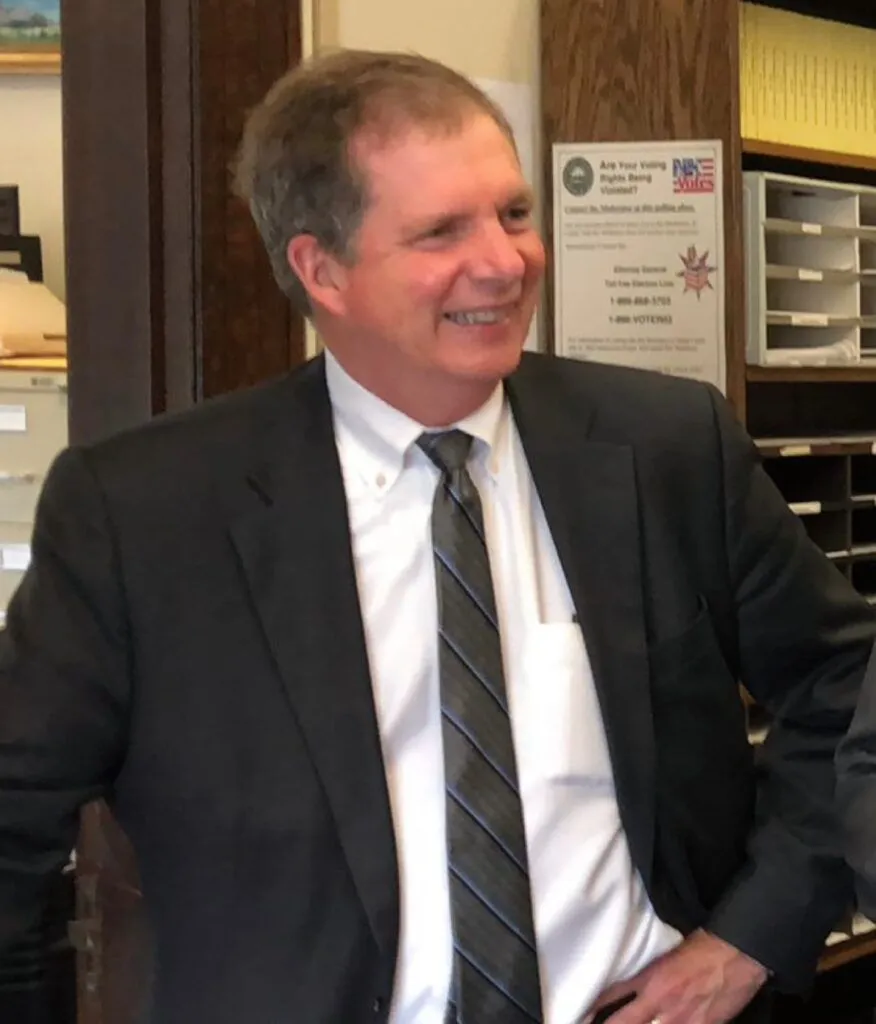New Hampshire set to pilot voting machines that use software everyone can see
Next week, three towns in New Hampshire will embark on a grand electoral experiment, Click Here and The Record have learned. On November 8, the Granite State will pilot a new kind of voting machine that will use open-source software — software that everyone can examine — to tally the votes.
“There’s a strong desire to see how ballot counting machines are actually counting the ballots,” New Hampshire’s Secretary of State, David Scanlan, told Click Here in an interview. “And open-source software really is the only way that you can do that effectively.”
The software that runs voting machines is typically distributed in a kind of black box — like a car with its hood sealed shut. Because the election industry in the U.S. is dominated by three companies — Dominion, Election Systems & Software and Hart InterCivic — the software that runs their machines is private. The companies consider it their intellectual property and that has given rise to a roster of unfounded conspiracy theories about elections and their fairness.
New Hampshire’s experiment with open-source software is meant to address exactly that. The software by its very design allows you to pop the hood, modify the code, make suggestions for how to make it better, and work with other people to make it run more smoothly. The thinking is, if voting machines run on software anyone can audit and run, it is less likely to give rise to allegations of vote rigging.
A transparent act
It’s a bit of a trope to say that New Hampshire punches above its weight politically. Every four years, the rural state of about 1.4 million residents attracts a scrum of national candidates vying for an early primary win. It sets the stage for contests that come later. So in some ways, it is hardly surprising that it would be first out of the gate in piloting new voting machines.
The effort to make voting machines more transparent is the work of a group called VotingWorks. One of its founders, Ben Adida, has been thinking about making U.S. elections more transparent and secure literally since he was a teenager, reading about cryptography in print magazines.
He wrote his PhD thesis at MIT on securing voting systems and then was a postdoctoral fellow at Harvard focusing on election security in the late 2000s. After taking some time off from the space, in 2018 he revisited the issue and was disappointed by the lack of progress. “I asked myself ‘What’s going on in voting?’ There's a number of problems with how this industry works. And surely one day it's gonna bite us, right?”
Adida insists that he didn’t predict the “Big Lie” about the 2020 election, but he was right that the polarization in this country would lead to a more general lack of trust in the vote. That led to his founding of VotingWorks, a non-profit that focuses on open-source voting machines and election audits. “I decided that we needed to change the incentives that vendors have in this space. And I thought that by going about it the non-profit way we could hold ourselves to a particularly high bar,” he said.

On November 8, VotingWorks machines will be used in a real election in real time. New Hampshire is the second state to use the open-source machines after Mississippi first did so in 2019. Some 3,000 voters will run their paper ballots through the new machines, and then, to ensure nothing went awry, those same votes will be hand counted in a public session in Concord, N.H. Anyone who cares to will be able to see if the new machines recorded the votes correctly.
The idea is to make clear there is nothing to hide. If someone is worried that a voting machine is programmed to flip a vote to their opponent, they can simply hire a computer expert to examine it and see, in real time.
The concept of building trust through publicly-accessible code isn’t new. The Firefox browser and the Python and Linux programming languages are all open-source. They are meant to be collaborative – anyone can view it, anyone can ask to modify it, and anyone can share it. And the theory is that all that scrutiny provides something else: security, because a lot of people are checking the work.
Familiar machines
So that’s the first part of VotingWorks’ mission – to make all the code that tracks and records the vote completely visible to anyone who wants to see it. So while outsiders won’t know who an individual voted for, they will know that vote was counted and there’s a paper record to prove it.
The second part of Adida’s New Hampshire pilot has to do with making an election feel the same way it always has. “It has to look like and feel like a voting system they already understand,” he said. “If you come up with some whizbang high tech feature that looks different, feels different… you’re making people uncomfortable” and more likely to wonder if there is anything else wrong with this new machine.
In response, VotingWorks’ voting machines allow voters to mark ballots by hand or by touchscreen. They use voter-verifiable paper ballots and finish the whole process with that red-white-and-blue sticker that reads “I Voted.” Classic voting.
While the New Hampshire pilot is small, it is part of a trend. Election officials have been considering ways to inject more transparency into voting machines for years, not just to blunt the suggestion that elections were somehow rigged, but to ensure that tallies are fast and accurate.
New Hampshire may have the first pilot in the nation, but it isn’t alone in its search for alternatives. Last year, a bill was introduced in the Alaska legislature to require voting systems’ code to be open source.
In France, they have a translucent ballot box. Your vote is in an envelope and everyone can watch the ballot drop into the box. There is a public observation of a process. VotingWorks is hoping open-source software will provide that kind of visibility.
Nearly 200 candidates running for office during this midterm cycle have said outright that the 2020 election was stolen. And while testing open-source technology in three small New England towns may feel like fighting a forest fire with a watering can, it is a start for New Hampshire Secretary of State Scanlan.
He’s determined to run a smooth election the people of New Hampshire believe in. “If we focus on that, we've done a good job,” he said. “Hopefully, we can convince as many voters as possible that everything that we do here is above board.”
Correction: An earlier version of this story stated that New Hampshire would be the first state to use VotingWorks machines in real time during an election. Mississippi was the first state to do so in 2019.
James Reddick
has worked as a journalist around the world, including in Lebanon and in Cambodia, where he was Deputy Managing Editor of The Phnom Penh Post. He is also a radio and podcast producer for outlets like Snap Judgment.
Dina Temple-Raston
is the Host and Managing Editor of the Click Here podcast as well as a senior correspondent at Recorded Future News. She previously served on NPR’s Investigations team focusing on breaking news stories and national security, technology, and social justice and hosted and created the award-winning Audible Podcast “What Were You Thinking.”



